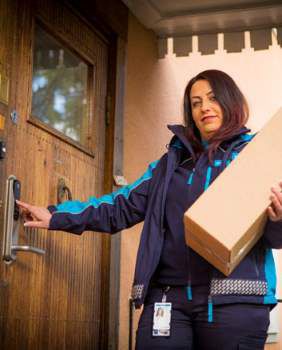
What urbanization means to ASSA ABLOY


ASSA ABLOY has been focused on the urbanization megatrend for many years, but there are also many sub trends arising from urbanization. An increase in multi-family housing and the rise of in-home services are just two examples. “We are helping people focus on what they want to do instead of having to stay at home all day to wait for a delivery”, says Björn Lidefelt.
Urbanization means the mass movement of people to cities. It is a global phenomena and one of four megatrends that ASSA ABLOY has identified as shaping the company’s future.
One of ASSA ABLOY’s main roles is to support infrastructure. That is why urbanization, which affects the need to provide infrastructure for the growing number of people living in cities, is so important to the Group. But Björn Lidefelt, Group Business Development Director, says that there is a lot more to urbanization than urban growth alone.
„The ASSA ABLOY belief is that within 10–15 years everyone in the western world will have a digital lock in their home.“
“We generally associate urbanization with people moving to cities, which is correct. We still have people moving into cities and that increases demand for our products; people need housing, schools and hospitals. But what happens on a secondary level? How does the market change due to urbanization? We are capitalizing not just on the fact that the cities are growing, but on the many other things happening as a result of more people living closer together.”
Urbanization sub trends
A number of sub trends therefore arise from urbanization, such as multi-family living, which although not new, is increasing everywhere as a result of the need to utilize city space more effectively.
“In multi-family houses you have some private areas like your apartment but you share common areas such as the entrance hall, cleaning rooms and training facilities,” says Björn. “On top of that you have people moving in and out of the building as well as the need to allow non residents access to some places while restricting access to others.”
ASSA ABLOY is addressing these complexities with many different products, both physical and digital. In Sweden, for example, the Group owns Aptus, which specializes in opening and locking solutions for apartment buildings. While in the US, the segment is addressed with the new Accentra platform, which is a cloud-based access control system perfect for use in multi-family housing.

(Aptus are one of the leading providers of access control systems, booking systems and entry phones in apartment buildings. The Aptus apps allow tenants to manage room bookings, see who is calling the entry phone and check the status of their apartment door straight from their phone.)
“In multi-family houses you have some private areas like your apartment but you share common areas such as the entrance hall, cleaning rooms and training facilities,” says Björn. “On top of that you have people moving in and out of the building as well as the need to allow non residents access to some places while restricting access to others.”
ASSA ABLOY is addressing these complexities with many different products, both physical and digital. In Sweden, for example, the Group owns Aptus, which specializes in opening and locking solutions for apartment buildings. While in the US, the segment is addressed with the new Accentra platform, which is a cloud-based access control system perfect for use in multi-family housing.
“These solutions are not only for highend housing, they also work with lower-end segments where the residence turnover can be high,” adds Björn.
Importance of Home Services
Home Services is another trend arising from urbanization and the fact that people have less time and are getting wealthier.
“With busy lives and more money, people want things delivered to their homes and they prioritize purchasing services such as food delivery and cleaning services,” says Björn. “But at the same time people don’t want to have to wait around to allow access to people providing these services. So these professionals need to get in and out of buildings in a safe and secure way. It’s a challenge. Leaving the key under the doormat is just not a good solution.”
These challenges apply to both residential living as well as smaller and medium-size businesses that can’t invest in larger scale access control systems. Björn thinks that consumers and businesses are quickly adapting to the new urbanized world and understand how technology and better infrastructure can make life easier within it.
“People are very quickly realizing that they can get rid of pain points,” he says. “Like giving secure access to a delivery person rather than waiting in all day to open the door themselves. Many think the convenience outweighs the concerns they have.”
„We can now drive business from allowing others to do business through the lock“
Locks as service enablers

Postal packages can now be delivered safely inside customers’ doors thanks to a new secure method devised by ASSA ABLOY and PostNord.
The ASSA ABLOY belief is that within 10–15 years everyone in the western world will have a digital lock in their home. This means a lot of sales in that time. It also means new recurring revenue opportunities.
“Locks are becoming service enablers,” says Björn. “We can now drive business from allowing others to do business through the lock. And these opportunities are happening globally at the same time, both in mature and emerging markets.”
ASSA ABLOY is addressing the challenges and opportunities arising from these urbanization trends in many different ways. These include product development, especially in the smart door lock field, IT infrastructure to make sure these products work as they should, and through sales development to adjust the business towards a more service and recurring revenue type.
But as well as ASSA ABLOY benefiting from urbanization and its many sub trends, Björn sees the reverse happening too.
“With all our work in this area we will support urbanization. We are making cities and people’s lives more effective and safe. We are helping people focus on what they want to do instead of for example having to stay at home all day to wait for a delivery!”
